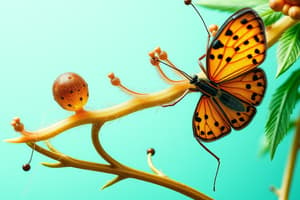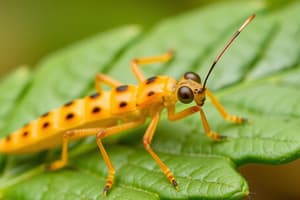Podcast
Questions and Answers
What is reproduction?
What is reproduction?
- The ability to maintain stable internal conditions
- The ability to reproduce sexually or asexually (correct)
- The ability to produce energy
- The ability to respond to the environment
What are the two types of reproduction?
What are the two types of reproduction?
Sexual and asexual
What characteristic of living things refers to being made up of cells?
What characteristic of living things refers to being made up of cells?
- Cells (correct)
- Homeostasis
- Development and growth
- Reproduction
All living organisms are multicellular.
All living organisms are multicellular.
What must living things be able to maintain in order to survive?
What must living things be able to maintain in order to survive?
What does 'response to the environment' mean for living things?
What does 'response to the environment' mean for living things?
What is homeostasis?
What is homeostasis?
What happens during development and growth?
What happens during development and growth?
Change over time refers to individual organisms changing.
Change over time refers to individual organisms changing.
Which of the following is NOT one of the six chemicals of life?
Which of the following is NOT one of the six chemicals of life?
List one of the six chemicals of life.
List one of the six chemicals of life.
Flashcards are hidden until you start studying
Study Notes
Reproduction
- Living organisms must be able to reproduce either sexually or asexually.
- Sexual reproduction involves two parent organisms contributing DNA to offspring.
- Asexual reproduction involves a single parent, common in unicellular organisms.
- Heredity allows organisms to pass on genetic information (DNA) to the next generation.
Cells
- All living things are composed of cells, the fundamental unit of life.
- Unicellular organisms consist of one cell, whereas multicellular organisms have multiple cells.
Energy
- Living organisms must maintain and produce energy to sustain life.
- Energy is obtained through consumption of food and liquids.
Response to the Environment
- Organisms actively respond to various environmental stimuli such as sounds, smells, and temperature changes.
Homeostasis
- Homeostasis refers to an organism's ability to maintain stable internal conditions despite external changes.
- It encompasses processes such as cell growth, internal balance, and response to environmental factors.
Development and Growth
- All living things undergo development and growth, which involves changes over time.
- For example, plants grow from seeds into mature plants, illustrating the developmental process.
Change Over Time (Evolution)
- Evolution entails changes within species over time rather than changes in individual organisms.
- Every species has the potential to change over generations.
Chemicals of Life
- Living organisms are primarily composed of six essential chemicals: phosphorus, carbon, oxygen, sulfur, nitrogen, and hydrogen.
- There are 118 known elements, but the biochemical composition of life is largely governed by these six elements, which can exist in various arrangements.
- Some organisms may include arsenic alongside the primary six chemicals.
Studying That Suits You
Use AI to generate personalized quizzes and flashcards to suit your learning preferences.




